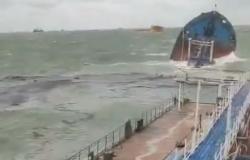HAS Damascus, life very quickly returned to normal. “It was one of our objectives,” assures Mostafa Fadlali, right-hand man of the new governor of Damascus, appointed by Hayat Tahrir al-Shams (HTC) shortly after. after the capture of the city by rebel fighters. Originally from Idlib, in the northwest of Syria, like almost all those who are now putting the Syrian state back on track, this civil servant, who holds a law degree, knows that he has little time to convince the Damascenes of its management capabilities. “Today, what matters to us is to get basic state services functioning again,” he adds.
It’s working quite well: state bakeries quickly reopened, waste is now collected and the supply of gasoline has been restored. Even the electricity seems to want to improve. “At this stage, it’s flawless,” recognizes Mohammed, a resident of Damascus, encountered in the Malki district while he is discussing the latest events with his mukhtar (a civil registrar).
Restart
HTC is betting on the delivery of basic services to attract a population which was deprived of them during almost the entire war. In this, the rebels are repeating the model of governance which allowed them to secure their power in Idlib, which is today among the best managed provinces in the country. And this despite a fierce siege by regime forces and the presence of tens of thousands of displaced people, grouped in camps.
Bakeries have reopened in much of the country.
FADEL ITANI / AFP
This same pattern was reproduced in Aleppo, conquered in early December. “This does not detract from the need to pay attention to the government’s first decisions regarding respect for minorities, women’s freedom or arbitrary executions. They asked us for three months to prove themselves: it seems to me that we can give them that, right? » explains Mohamed Hourani, the mukhtar of the Malki district.
OMAR HAJ KADOUR / AFP
Near Damascus University, students drag into the street a toppled statue of former president Hafez al-Assad, who died in 2000, father of Bashad al-Assad.
But the priority given to getting the Syrian state back on track has an immediate consequence: the postponement of the question of settling scores with the regime’s former thugs. The team of “people of Idlib”, which takes over everywhere, has not de facto carried out a large-scale purge, nor a priori mass executions (a few assassinations seem to have taken place without anyone being aware of it). still know who is responsible).
Avoid chaos
Within the administration, governance even knowingly preserves the intermediate levels on which Ahmed el-Chareh, head of HTC and Syria’s new strongman, plans to rely on to restart the country. With the exception of the security services (army, police, etc.), corrupted by Bashar al-Assad’s men, and of which HTC inevitably distrusts. “Justice will be done: committees will be set up to purge the administration of shabihas [les gangs au service d’Assad, NDLR]but, for now, we are retaining the technical teams. Otherwise, the state would collapse and chaos would set in,” continues the new official of the Damascus municipality.
“Justice will be done: committees will be set up to purge the administration of the shabihas”
One last time, Mostafa Fadlali pleads his cause by ensuring that the “promised political transition”, i.e. the integration of all Syrian components within the government, will come next, in a second phase, when the survival of the Syrian state and the security of its institutions will have been ensured.







